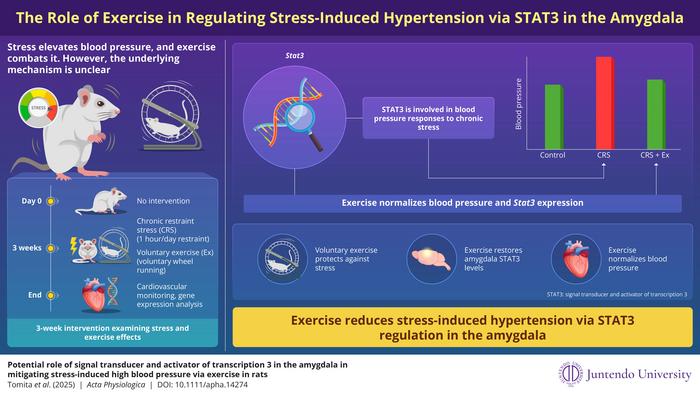
Hypertension, commonly known as high blood pressure, is a growing concern worldwide, classified as a leading contributor to various cardiovascular diseases and a significant cause of premature mortality. The complexity of this condition arises not just from physiological factors, but also from the influence of psychological stressors that can exacerbate or even trigger episodes of high blood pressure. Researchers from Juntendo University in Japan have elucidated an intriguing mechanism through which voluntary exercise may combat stress-induced hypertension. Their study reveals the potential of the brain’s amygdala and a specific gene known as signal transducer and activator of transcription 3 (Stat3) as pivotal players in this process.
The research team, led by Professor Hidefumi Waki, along with Dr. Keisuke Tomita and Dr. Ko Yamanaka, conducted a rigorous experimental study published in the journal Acta Physiologica. Their investigations stemmed from the observation that chronic stress has a profound impact on blood pressure regulation. While the detrimental effects of stress on cardiovascular health are well-documented, this study dives deeper into the biochemical pathways that connect psychological strain with physiological outcomes, particularly focusing on the role of the amygdala.
The amygdala, an almond-shaped structure within the brain, is known for its critical role in emotion processing and response to stress. This study specifically targeted how chronic stress affects the expression of Stat3 within this region. Stat3 is a vital gene, instrumental in regulating various physiological functions, including blood pressure modulation in response to environmental stimuli. The research team subjected test subjects—rats—to a regimen of chronic stress over three weeks, while allowing one cohort the opportunity to engage in voluntary exercise through running wheels.
The implications of the findings were stark: chronic stress resulted in significantly elevated blood pressure levels and a marked decline in the expression of Stat3 within the amygdala. This decrease in Stat3 expression potentially signals an impairment in the amygdala’s ability to regulate blood pressure effectively. Upon investigating further, the researchers observed that when stressed rats participated in consistent exercise, they not only normalized their blood pressure but also experienced a rebound in Stat3 levels. This led the researchers to hypothesize that exercise acts as a protective mechanism against the hypertension induced by stress.
Subsequent studies elaborated on this phenomenon, with scientists blocking Stat3 expression in the amygdala of non-stressed rats, which resulted in an increase in blood pressure. Such findings underscore the complex interplay between the amygdala’s genetic activity and cardiovascular regulation, illustrating that Stat3 is a critical component in the body’s response to stressors. The researchers argue that these dynamics highlight the neuroprotective effects of exercise in relation to hypertension; while physical activity is already lauded for its benefits to heart health, this research suggests a deeper, mechanistic relationship that could redefine treatment approaches.
Professor Waki elaborates on the potential implications, stating that the restoration of Stat3 expression and its associated mechanisms involve neuroprotection and anti-inflammatory processes, which are crucial for maintaining cardiovascular health. This study positions itself at the intersection of neuroscience and cardiology, begging the question of how exercise can serve as a formidable non-pharmacological intervention for those suffering from stress-related hypertension.
The importance of these findings cannot be overstated, particularly in an age where stress-related illnesses are rampant. Understanding the mechanisms by which our bodies and minds can counteract the detrimental effects of stress opens new avenues for therapeutic interventions that do not solely rely on medications. Regular physical activity may serve not just as a preventative measure, but also as a rehabilitative strategy for stress-induced cardiovascular issues.
The research team acknowledges the necessity for further investigations, particularly clinical studies involving human subjects, to extrapolate these findings to broader populations. If future studies validate the role of Stat3 in humans, targeting this gene could pave the way for innovative treatments for hypertension, particularly tailored for those with elevated stress levels.
As the world grapples with increased stress and its myriad health impacts, this study offers a beacon of hope. The inherent message is clear and resonant: engaging in physical activity might just be as beneficial for our mental health as it is for our physical wellbeing. Exercise emerges not only as a means to maintain physical fitness but also as an essential practice for mental resilience against stressors that threaten our health.
In conclusion, the compelling evidence presented by the Juntendo University researchers propels us to reconsider the simple act of exercising as a multi-faceted tool for health, capable of modulating both emotional and physiological states. This reinforces the idea that dedicating time to exercise is not merely a lifestyle choice but a critical proactive measure for long-term health benefits, especially concerning blood pressure regulation in the face of chronic stress.
Subject of Research: Animals
Article Title: Potential role of signal transducer and activator of transcription 3 in the amygdala in mitigating stress-induced high blood pressure via exercise in rats
News Publication Date: 13-Jan-2025
Web References: DOI: 10.1111/apha.14274
References: Acta Physiologica
Image Credits: Prof. Hidefumi Waki, Juntendo University
Keywords: Hypertension, Stress, Exercise, Amygdala, Stat3, Cardiovascular Health, Neuroscience, Physical Activity, Gene Expression, Non-Pharmacological Intervention.
Tags: biochemical pathways in hypertensionbrain’s amygdala role in blood pressurecardiovascular disease prevention strategiesemotional processing and cardiovascular riskexercise benefits for blood pressure regulationHypertension management through exerciseimpact of chronic stress on cardiovascular healthJuntendo University hypertension studypsychological stress and hypertensionStat3 gene influence on blood pressurestress-induced hypertension mechanismsvoluntary exercise and stress relief





